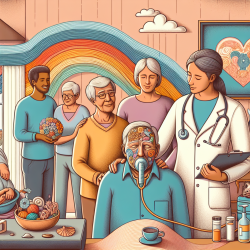Key Takeaways for Practitioners
The study highlights several key points that can be implemented to improve therapy outcomes:
- Blended Therapy as a Motivator: The integration of web-based elements with traditional face-to-face sessions can act as a powerful motivator for patients. The study found that patients appreciated the flexibility and support offered by the web-based components, which helped them stay engaged and motivated.
- Facilitating Self-Disclosure: Web-based platforms provide an additional channel for patients to communicate with therapists, fostering a sense of intimacy and trust. This can be particularly beneficial in a group setting where some patients may feel hesitant to share openly.
- Dynamic Interplay Between Group and Technology: The study revealed that the combination of group dynamics and technology can lead to a more cohesive and supportive environment. Web-based sessions can prepare patients for upcoming group discussions, enhancing the overall therapeutic experience.
- Enhanced Psychoeducation: The use of multimedia elements such as videos and interactive content can make psychoeducation more engaging and effective. Patients reported that these elements helped them better understand and retain therapeutic concepts.
- Monitoring and Feedback: Web-based tools allow therapists to monitor patient progress and provide timely feedback. This continuous loop of feedback and adjustment can lead to better treatment outcomes.
Encouraging Further Research
While the study provides a solid foundation, it also opens the door for further research. Practitioners are encouraged to explore additional ways to integrate technology into their therapeutic practices. Areas such as tele-groups and more personalized web-based interventions hold promise for future developments.
Conclusion
Blended group therapy offers a structured and proactive approach to treating depression. By integrating web-based elements, therapists can enhance patient engagement, facilitate self-disclosure, and improve overall treatment outcomes. The insights from this study serve as a valuable resource for practitioners looking to adopt or refine blended therapy approaches.
To read the original research paper, please follow this link: Patients’ Experiences of Web- and Mobile-Assisted Group Therapy for Depression and Implications of the Group Setting: Qualitative Follow-Up Study.










